 There is no such thing as a “sin nature.” The Bible never refers to the “sin nature.” It is a myth of modern theology. However, the Bible DOES teach a lot about the “flesh.” This study looks at Galatians 5:19-23 to learn what the flesh actually is, and what we are to live in the Spirit rather than in the flesh.
There is no such thing as a “sin nature.” The Bible never refers to the “sin nature.” It is a myth of modern theology. However, the Bible DOES teach a lot about the “flesh.” This study looks at Galatians 5:19-23 to learn what the flesh actually is, and what we are to live in the Spirit rather than in the flesh.
Note that this study is an excerpt from my Gospel Dictionary online course. This course considers 52 key words of the Gospel and thousands of biblical texts. The course contains over 100 hours Bible teaching. You can take the course by joining my online discipleship group.
So let us see what we can learn about the flesh from Galatians 5:19-23.
The Fruit of the Flesh in Galatians 5:19-23; 6:8
Now the works of the flesh are evident, which are: adultery, fornication, uncleanness, lewdness, idolatry, sorcery, hatred, contentions, jealousies, outbursts of wrath, selfish ambitions, dissensions, heresies, envy, murders, drunkenness, revelries, and the like; of which I tell you beforehand, just as I also told you in time past, that those who practice such things will not inherit the kingdom of God (Galatians 5:19-21).
For he who sows to his flesh will of the flesh reap corruption, but he who sows to the Spirit will of the Spirit reap everlasting life (Galatians 6:8).
 The church in Galatia was divided over the issue of circumcision. Some argued that circumcision was required by God, while others said that it was not. Paul wrote to the Galatians to weigh in on this matter.
The church in Galatia was divided over the issue of circumcision. Some argued that circumcision was required by God, while others said that it was not. Paul wrote to the Galatians to weigh in on this matter.
The term flesh often refers to the tendency of humans to focus primarily on fleshly, material matters for decision making, and when it comes to religion, to focus only on external behaviors and actions as a way of deciding who was in the right with God and who was not.
The Circumcision of the Flesh
The issue of circumcision is a perfect example of how religious zeal for an external behavior causes some to judge, condemn, and divide from others people. Some were even accusing, cursing, and condemning others over the issue of circumcision (see Accursed).
The letter to the Galatians is one of the places where Paul exhibits some profound humor and wit. Since the word flesh can euphemistically refer to the male sex organ, and since the Galatians were giving in to their fleshly desire to separate from one another over the external religious behavior of circumcision, Paul uses the term flesh to refer to both the male sex organ and the religious issue of circumcision.
So, for example, in once place Paul writes that if cutting a bit of skin away from one’s “member” makes them more spiritual than others, maybe they could become super spiritual by cutting everything away and emasculating themselves (Galatians 5:12).
This is theological humor at its finest! Paul makes a dick joke to reveal the infertility of fleshly thinking. Cutting some flesh from the male sex organ does nothing to make a person morally or spiritually superior to others. Neither the flesh nor the cutting of it produces the righteousness of God.
The Fruit of the Flesh
There is something, however, that the flesh does produce. Paul lists the “fruit” (or offspring) of the flesh in Galatians 5:19-21. And while many of the behaviors listed in these verses are sexual sins (adultery, fornication, uncleanness, lewdness), most of the behaviors listed are those that come from a sense of moral and religious superiority over others (hatred, contentions, jealousies, outbursts of wrath, selfish ambitions, dissensions, heresies, envy, murders).
Paul’s point is that cutting a bit of skin from one’s body does nothing to make one more righteous and holy before God, but in fact, can lead to the exact opposite. What matters, therefore, is cutting away the behaviors and attitudes from one’s life that are damaging and destructive toward others.
This is why Paul encourages the Galatians to not be led by their “flesh,” but by the Spirit, which will result in character and behaviors like that of Jesus Christ.
To put it crassly, Paul is saying, “Don’t be led by a dick; be led by the Spirit.” To truly accomplish God’s will in our lives, we must follow the example of Jesus and the spirit of the law by practicing love, joy, peace, longsuffering, kindness, goodness, faithfulness, gentleness, and self-control (Galatians 5:22-23). Such things are the true signs of a godly person.
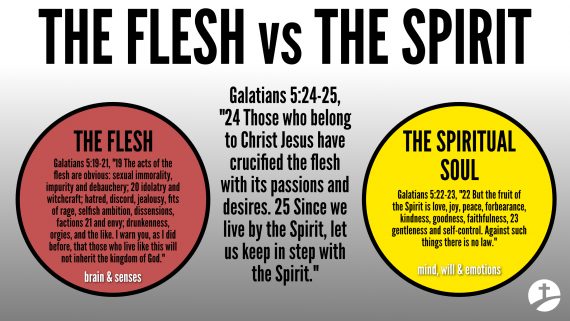
This is the point Paul makes in the concluding remarks of the main body of his letter. In Galatians 6:8 he writes that sowing with the flesh results only in corruption, while sowing with the Spirit leads to everlasting life. The image of sowing seed with the flesh is another euphemism.
While the flesh is not evil, it cannot produce the righteous life that God wants and desires for His children. Christians cannot accomplish what God really desires for us in life by focusing on external and physical religious rituals such as circumcising the male sexual organ. Only a life led by the Spirit can produce what the Spirit of God wants in our lives.
At the end of the Galatians 6:8, Paul says that sowing in the Spirit allows us to reap everlasting life. This does not mean that living by the Spirit allows a person to gain or earn eternal life for themselves. Instead, Paul’s terminology is parallel to the terminology in Galatians 5:23 where he writes about inheriting the kingdom of God.
Since inheriting the kingdom of God means experiencing the rule and reign of God in our lives now, reaping eternal life also refers to experiencing some aspects of eternal life here and now.
Eternal life begins the moment we believe in Jesus for it, and while the full experience of eternal life awaits glorification in our resurrected bodies, we can begin to experience eternal life now by how we live as followers of Jesus. Just as we will live in light of spiritual realities for eternity, we can experience eternity now by living in light of these spiritual realities now.
What do you think of this explanation of the fruit of the flesh in Galatians 5:19-23? Let me know in the comments below!
 Understanding the Gospel requires us to properly understand the key words and terms of the Gospel. Take my course, "The Gospel Dictionary" to learn about the 52 key words of the Gospel, and hundreds of Bible passages that use these words.
Understanding the Gospel requires us to properly understand the key words and terms of the Gospel. Take my course, "The Gospel Dictionary" to learn about the 52 key words of the Gospel, and hundreds of Bible passages that use these words.
This course costs $297, but when you join the Discipleship group, you can to take the entire course for free.




 There is no such thing as a “sin nature.” The Bible never refers to the “sin nature.” It is a myth of modern theology. However, the Bible DOES teach a lot about the “flesh.” This study looks at 1 Corinthians 15:35-58 to learn what the flesh actually is, and what we are to live in the Spirit rather than in the flesh.
There is no such thing as a “sin nature.” The Bible never refers to the “sin nature.” It is a myth of modern theology. However, the Bible DOES teach a lot about the “flesh.” This study looks at 1 Corinthians 15:35-58 to learn what the flesh actually is, and what we are to live in the Spirit rather than in the flesh.



 The carnal person, then, is the opposite of the spiritual person. The carnal person may appear to be quite “spiritual” and religious, but they are unable to grasp, understand, or practice the greater truths of Christianity which lead us lay down our lives for others in love and service to them. The carnal, or fleshly person is not necessarily one who gives in to the passions and lusts of the flesh, but is rather one who thinks that the chills and thrills of ecstatic religion makes them superior to others.
The carnal person, then, is the opposite of the spiritual person. The carnal person may appear to be quite “spiritual” and religious, but they are unable to grasp, understand, or practice the greater truths of Christianity which lead us lay down our lives for others in love and service to them. The carnal, or fleshly person is not necessarily one who gives in to the passions and lusts of the flesh, but is rather one who thinks that the chills and thrills of ecstatic religion makes them superior to others. It is indeed true that some of the Corinthian Christians were engaging in sinful sensuality (cf. 1 Corinthians 5:1; 6:9-10). But when Paul uses a word to describe this sort of behavior, he does not use the word “flesh” to describe this behavior, but the word “unrighteous” (1 Corinthians 6:9). Yes, fleshly, carnal thinking leads to unrighteous behavior, which is why Paul instructs the Corinthians to hand a man over to Satan for the destruction of his flesh (1 Corinthians 5:5; see Satan for a discussion of what this means).
It is indeed true that some of the Corinthian Christians were engaging in sinful sensuality (cf. 1 Corinthians 5:1; 6:9-10). But when Paul uses a word to describe this sort of behavior, he does not use the word “flesh” to describe this behavior, but the word “unrighteous” (1 Corinthians 6:9). Yes, fleshly, carnal thinking leads to unrighteous behavior, which is why Paul instructs the Corinthians to hand a man over to Satan for the destruction of his flesh (1 Corinthians 5:5; see Satan for a discussion of what this means).



 I will be returning to publishing my Bible Studies and podcasts next week so you can learn the meaning of some tricky passages in Scripture. Hopefully these studies will continue to help you in your spiritual growth in 2020 the way they have for the past 20 years.
I will be returning to publishing my Bible Studies and podcasts next week so you can learn the meaning of some tricky passages in Scripture. Hopefully these studies will continue to help you in your spiritual growth in 2020 the way they have for the past 20 years. One of the courses is about
One of the courses is about 

 I read and study Scripture every day, not only for personal and spiritual growth, but also because I like to teach others what I have learned from the Bible.
I read and study Scripture every day, not only for personal and spiritual growth, but also because I like to teach others what I have learned from the Bible.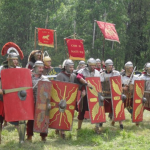
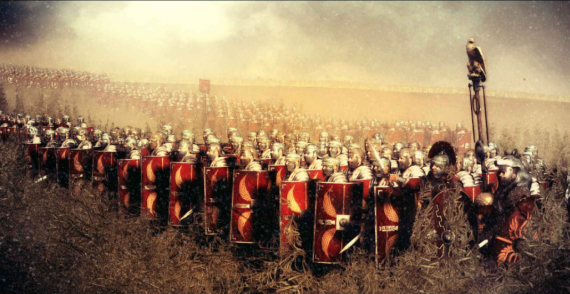
 But sending a runner was not always the best option. Runners could not be used when the distance was too far, when the message was too urgent, or when enemy forces were in the way. So the Roman military devised an ingenious solution for such situations. They developed a system of communication which could quickly send short messages over long distances and even to other units that were separated from the main force.
But sending a runner was not always the best option. Runners could not be used when the distance was too far, when the message was too urgent, or when enemy forces were in the way. So the Roman military devised an ingenious solution for such situations. They developed a system of communication which could quickly send short messages over long distances and even to other units that were separated from the main force.
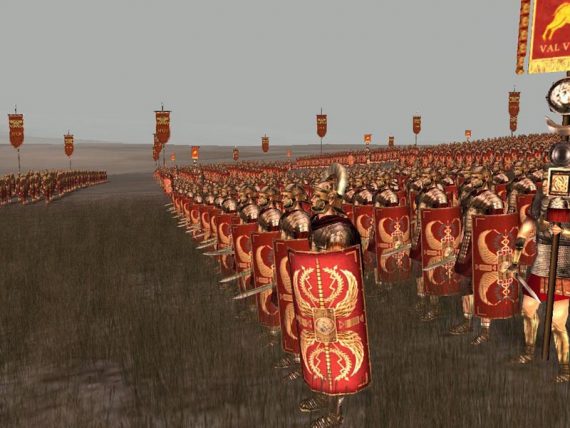


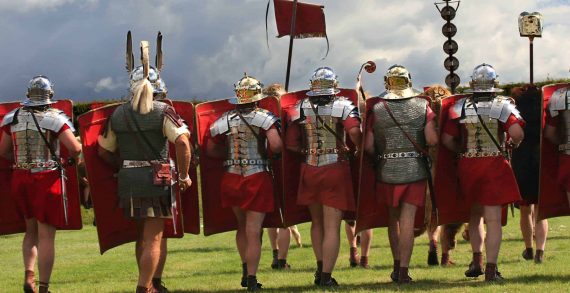
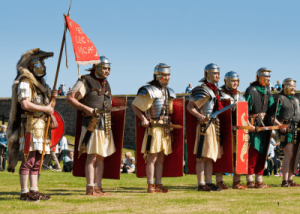

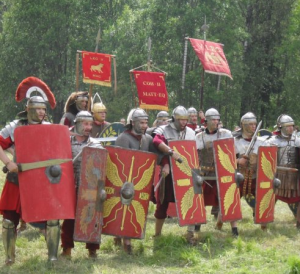

 This bring up the third reason some prayers require perseverance. Sometimes, God does not immediately answer our requests because He wants us to remain in communication with Him. God is not playing games with us by making us wait for some of the things we request, but at the same time, God doesn’t want us to play games with Him.
This bring up the third reason some prayers require perseverance. Sometimes, God does not immediately answer our requests because He wants us to remain in communication with Him. God is not playing games with us by making us wait for some of the things we request, but at the same time, God doesn’t want us to play games with Him. Victor Walter also found that most prayers were for groups of people, rather than for individuals. If a prophet or apostle had an issue with a person or a solution for a problem they faced, they spoke directly to that person about it, rather than praying to God for it.
Victor Walter also found that most prayers were for groups of people, rather than for individuals. If a prophet or apostle had an issue with a person or a solution for a problem they faced, they spoke directly to that person about it, rather than praying to God for it. Indeed, Paul has firsthand knowledge and experience of this front line warfare, and he indicates this by describing himself as an ambassador in chains. Paul wrote the letter of Ephesians from prison, likely while being chained between two Roman guards. And he was in prison because he had declared the gospel, and was facing a death sentence for the same reason.
Indeed, Paul has firsthand knowledge and experience of this front line warfare, and he indicates this by describing himself as an ambassador in chains. Paul wrote the letter of Ephesians from prison, likely while being chained between two Roman guards. And he was in prison because he had declared the gospel, and was facing a death sentence for the same reason.

 As we go about our own work as Christians, we too must keep a sword strapped to our side. Not a sword made from steel with which to kill other people—for our struggle is not against flesh and blood—but a spiritual sword with which to demolish spiritual enemies and defend ourselves against all the wiles of the devil.
As we go about our own work as Christians, we too must keep a sword strapped to our side. Not a sword made from steel with which to kill other people—for our struggle is not against flesh and blood—but a spiritual sword with which to demolish spiritual enemies and defend ourselves against all the wiles of the devil. Everybody knows what a sword looks like. And we have likely all seen pictures or movies of Roman soldiers carrying their sword. The swords that were typically used in Paul’s day were made of iron, and were double-edged. Like many swords, they came to a point, had a hilt, and a guard to protect the hand of the sword bearer. The Roman sword also had a metal knob at the base of the hilt which could be used to bash an enemy in the face or head if needed.
Everybody knows what a sword looks like. And we have likely all seen pictures or movies of Roman soldiers carrying their sword. The swords that were typically used in Paul’s day were made of iron, and were double-edged. Like many swords, they came to a point, had a hilt, and a guard to protect the hand of the sword bearer. The Roman sword also had a metal knob at the base of the hilt which could be used to bash an enemy in the face or head if needed. We would think that of all the pieces of spiritual armor, the sword would be the one piece with which the soldier could attack the enemy, but this is not really the case. Even here, as with all the other pieces of armor, the short sword was primarily used for defense. It was not used to advance against an enemy army, but was used to defend a position on the field of battle which had already been gained.
We would think that of all the pieces of spiritual armor, the sword would be the one piece with which the soldier could attack the enemy, but this is not really the case. Even here, as with all the other pieces of armor, the short sword was primarily used for defense. It was not used to advance against an enemy army, but was used to defend a position on the field of battle which had already been gained. The graphē, the writings, or the logos, the Word of God, refers to what we call the Bible, as a written revelation from God. It is important to note that the second term, logos, can also refer to Jesus as the living, incarnate Word of God (cf. John 1:1-11). There is a written logos, the Bible, and a living Logos, Jesus, and both are divine revelations from God.
The graphē, the writings, or the logos, the Word of God, refers to what we call the Bible, as a written revelation from God. It is important to note that the second term, logos, can also refer to Jesus as the living, incarnate Word of God (cf. John 1:1-11). There is a written logos, the Bible, and a living Logos, Jesus, and both are divine revelations from God.
 We must exercise with the Bible until it is stamped into our minds, so that when it is needed, our muscle memory kicks in and the use of the sword becomes second nature and automatic.
We must exercise with the Bible until it is stamped into our minds, so that when it is needed, our muscle memory kicks in and the use of the sword becomes second nature and automatic. We could sit in a circle and say, “Very often, we feel like God does not love us and cannot forgive us for some sin we have committed. What truths or verses in Scripture can remind us of God’s infinite love and complete forgiveness?” (Some possible answers: John 3:16; Rom 5:8; 8:38-39; 1 John 2:1-2; 4:7-10).
We could sit in a circle and say, “Very often, we feel like God does not love us and cannot forgive us for some sin we have committed. What truths or verses in Scripture can remind us of God’s infinite love and complete forgiveness?” (Some possible answers: John 3:16; Rom 5:8; 8:38-39; 1 John 2:1-2; 4:7-10). And you must keep immersing yourself in Scripture, day in and day out, so that you know what the Scripture says and how to apply its promises to your life when lies and deceptions of the devil start to tear you down. If you want to have your sword with you in spiritual battle, you need to be skilled with the Word of God. And the only way to gain skill in Scripture is to practice using Scripture as much as possible.
And you must keep immersing yourself in Scripture, day in and day out, so that you know what the Scripture says and how to apply its promises to your life when lies and deceptions of the devil start to tear you down. If you want to have your sword with you in spiritual battle, you need to be skilled with the Word of God. And the only way to gain skill in Scripture is to practice using Scripture as much as possible.
 Therefore, if we want to change our actions, we must begin by changing our thoughts. To change how we act, we must begin by changing how we think.
Therefore, if we want to change our actions, we must begin by changing our thoughts. To change how we act, we must begin by changing how we think.
 The helmet in Paul’s day was most often made of heavy bronze or iron, and had additional pieces of metal which came down to protect the side of the face. The soldiers would often pack their helmets with some sort of cloth or padding to make them more comfortable on the head.
The helmet in Paul’s day was most often made of heavy bronze or iron, and had additional pieces of metal which came down to protect the side of the face. The soldiers would often pack their helmets with some sort of cloth or padding to make them more comfortable on the head. But what purpose did the helmet serve?
But what purpose did the helmet serve?
 Specifically, in Ephesians 2, Paul describes the exact form of deception he wants his readers to be liberated from. In
Specifically, in Ephesians 2, Paul describes the exact form of deception he wants his readers to be liberated from. In 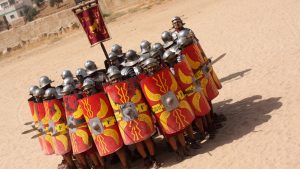 And since our thoughts come from the brain, this is why Paul equates salvation with the helmet. The helmet protects our head.
And since our thoughts come from the brain, this is why Paul equates salvation with the helmet. The helmet protects our head.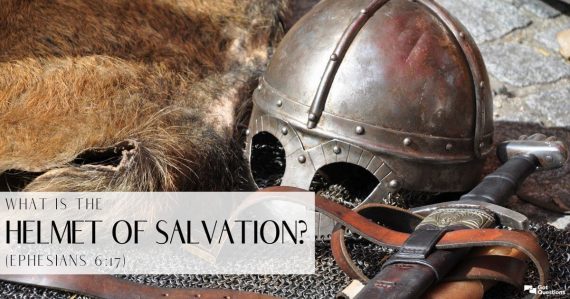
 It begins with how we think about other people. The helmet protects our brain, and the thoughts of our brain guide our emotions, which in turn determine our actions. So if we want to treat people like Jesus treated them, we must learn to think about people the way He thought about them.
It begins with how we think about other people. The helmet protects our brain, and the thoughts of our brain guide our emotions, which in turn determine our actions. So if we want to treat people like Jesus treated them, we must learn to think about people the way He thought about them.
 We must tell people that they are forgiven and accepted, not just by God, but by us as well. We must speaks words of beauty and praise to other people for the good things they do and the accomplishments they attain.
We must tell people that they are forgiven and accepted, not just by God, but by us as well. We must speaks words of beauty and praise to other people for the good things they do and the accomplishments they attain.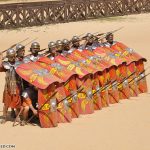
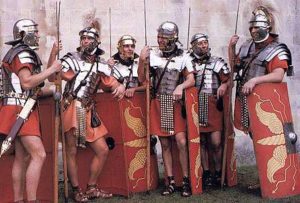
 Remember, the strength and genius of the Roman military was their ability to stand firm and stay in once place on the field of battle, defending their small piece of land from any and all attackers. The shield served a significant role in this strategy.
Remember, the strength and genius of the Roman military was their ability to stand firm and stay in once place on the field of battle, defending their small piece of land from any and all attackers. The shield served a significant role in this strategy.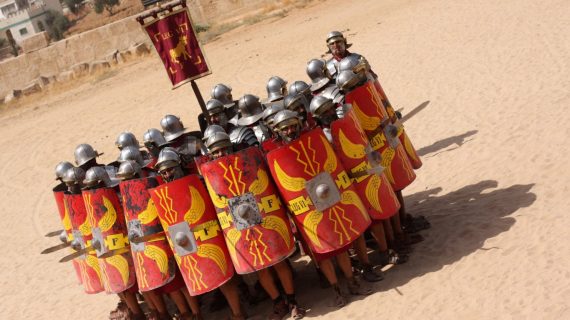
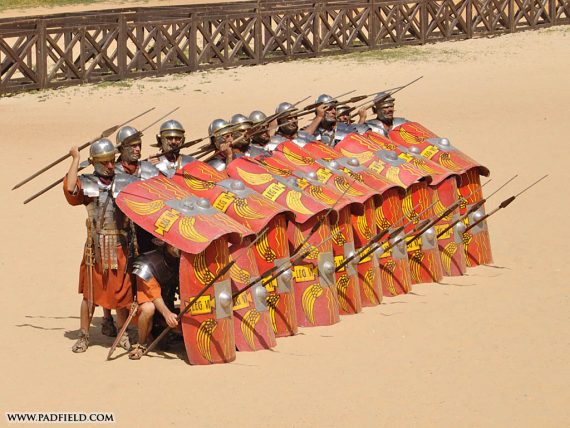
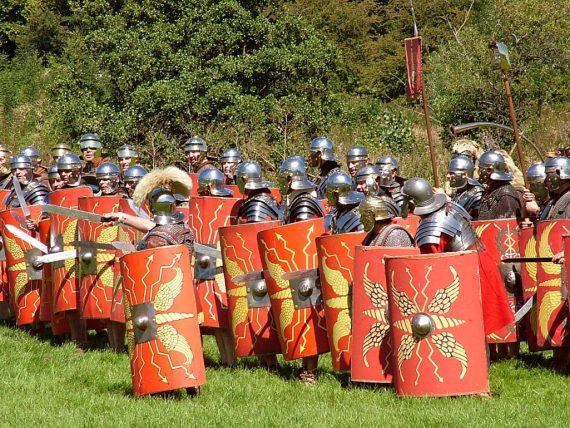

 Faith, as taught in the Bible, can be defined as a reasonable certainty about any truth claim or statement of fact.
Faith, as taught in the Bible, can be defined as a reasonable certainty about any truth claim or statement of fact.
 When temptations do get through, and when we get wounded by the fiery darts of the devil, it is because we have dropped our shield. The only way the fiery darts of temptation get past the protective shield of God is when we have not properly taken up the shield of faith, as Paul instructions in Ephesians 6:16. When the shield drops, when we let down our guard, it is then that the fiery darts are able to get through and wound us.
When temptations do get through, and when we get wounded by the fiery darts of the devil, it is because we have dropped our shield. The only way the fiery darts of temptation get past the protective shield of God is when we have not properly taken up the shield of faith, as Paul instructions in Ephesians 6:16. When the shield drops, when we let down our guard, it is then that the fiery darts are able to get through and wound us. So to grow our faith, to walk by faith, to live by faith, and to take up the shield of faith, we must begin with the facts and truths we know to be true, and then build upon these ideas with more truths and ideas from Scripture.
So to grow our faith, to walk by faith, to live by faith, and to take up the shield of faith, we must begin with the facts and truths we know to be true, and then build upon these ideas with more truths and ideas from Scripture. Do you see? As we come to learn and believe these promises of God, they become a shield and a barrier protecting us from all the lies of the devil.
Do you see? As we come to learn and believe these promises of God, they become a shield and a barrier protecting us from all the lies of the devil.